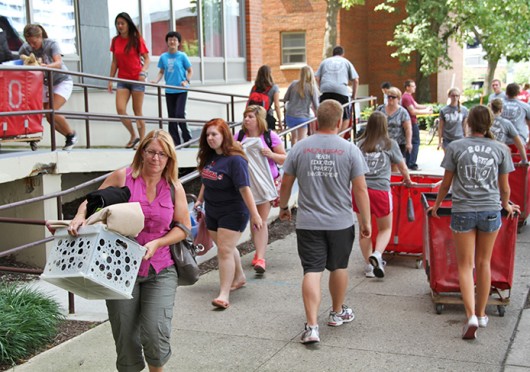
Ohio State students move into dorms. With campus closed and the status of in-person fall classes uncertain, some incoming freshmen have concerns about their first-year experience. Credit: Lantern file photo
Without the traditional experience of following the backward-walking peer leaders around campus in the mid-summer Columbus heat of orientation, some incoming freshmen are questioning whether the COVID-19 pandemic will keep them from having any kind of in-person first-year college experience.
Buckeyes bound for Ohio State this fall have an uncertain college transition ahead with the university’s March 19 campus closure and freshman orientation moved online due to the COVID-19 pandemic. University President Michael V. Drake said in an April 23 interview with The Lantern that a decision on whether those students will be sitting in a classroom or in front of their computers on the first day of classes should be made by the end of June.
Last fall, Ohio State had 7,630 first-years join the Columbus campus community, according to the fall 2019 15th day enrollment report.
At the time of publication, university spokesperson Ben Johnson said in an email it was “too soon” for Ohio State to comment on the impact on the university’s First Year Experience program, which typically hosts summer programs for incoming students and events during the school year to help them adjust to college.
Brigid Simmons, an incoming first-year in Spanish and economics from Wyoming High School in Wyoming, Ohio, said she feels the possibility of not being on campus in the fall may negatively impact her first year of college.
“I think that meeting people, especially the first few months of college, is definitely integral to your experience,” Simmons said. “Not having a normal transition, not being able to go to football games and meet new people, I think it will definitely have an impact. It will suck, quite frankly.”
Simmons said she also believes that interaction with other students is an important factor in the learning process and helps with her studies.
“I definitely would describe myself as a motivated person, but a lot of that motivation comes from being in a classroom and engaging with students and a professor,” Simmons said. “I think that is very unnatural in an online setting.”
These sentiments were echoed by Angelina Atieh, an incoming first-year in neuroscience from DuPont Manual High School in Louisville, Kentucky.
“I see my classmates accomplishing great things, and they push me to work harder and to perform at a higher level,” Atieh said.
Orientation is typically a time for students to learn how to navigate campus, schedule classes and meet new people, but Atieh said she believes online orientation may have a greater impact on out-of-state students, especially if classes are in-person this fall. She said that she visited campus twice before it closed, but could see how other out-of-state students who did not have that opportunity may run into problems during their transition.
“I feel like I do have an advantage over a lot of other students who might be coming in out of state,” Atieh said. “I can see where some problems can arise, like if I don’t realize how big the campus is in terms of finding classes on North Campus or South.”
Both Atieh and Simmons cited the potential loss of the coming football season as something that would negatively impact their freshman year. Simmons said she still has some concerns about being in a large group setting on campus.
“I would say I have some fear of, say, being at a football game or a tailgate with lots of people,” Simmons said.
With all the uncertainties about what is to come in the fall, Simmons said she is putting her trust in the professionals.
“I think if we’re cleared to go back to school, then I trust the doctors and the governor,” Simmons said. “I trust the people who are working with real numbers, working with the data, and their decision-making process.”


